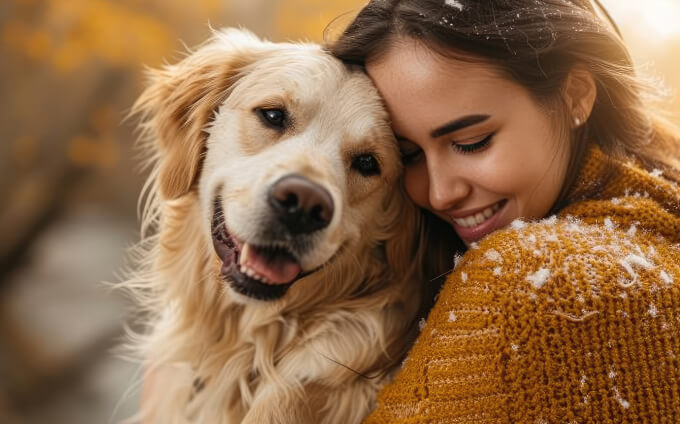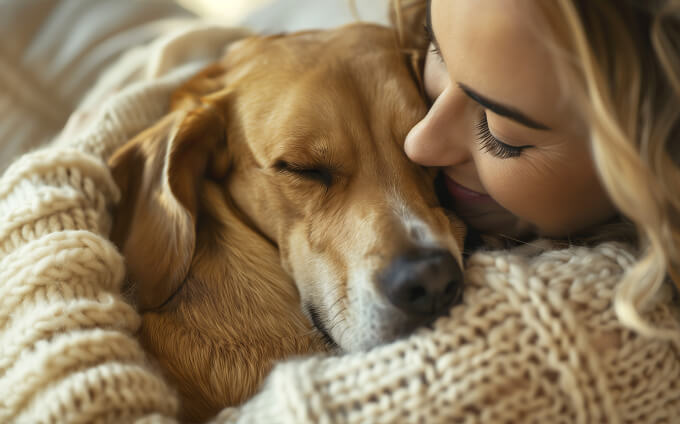- Home
- Dog health
- How Well Can Dogs Hear?
How Well Can Dogs Hear?
Dogs have an incredible sense of hearing, capable of detecting sounds that are beyond human perception. From the range of frequencies they can hear to the practical implications of their auditory prowess, let's delve into the world of canine hearing.

- 29

The Anatomy of a Dog's Ear
To truly appreciate how well dogs hear, it's essential to understand the anatomy of their ears. A dog's ear is divided into three parts: the outer ear, the middle ear, and the inner ear. The outer ear captures sound waves and funnels them into the ear canal. The middle ear contains the eardrum and three small bones that amplify sound vibrations. Finally, the inner ear, with its cochlea and vestibular system, converts these vibrations into nerve signals that the brain interprets as sound.
Frequency Range: Hearing What Humans Cannot
Dogs can hear frequencies ranging from 40 Hz to 65,000 Hz, far surpassing the human range of 20 Hz to 20,000 Hz. This extraordinary range allows dogs to detect high-pitched sounds, such as the ultrasonic frequencies emitted by dog whistles, which are inaudible to humans. This capability stems from the greater number of hair cells in a dog's cochlea, enhancing their ability to perceive a wider range of frequencies.
Practical Applications
- Dog whistles: Used for training and communication without disturbing humans.
- Detecting high-pitched sounds: Useful in search and rescue operations, where dogs can hear faint cries for help.
Distance: Hearing From Afar
Dogs' hearing is not just about frequency; it's also about distance. They can hear sounds from four to five times farther away than humans can. This ability is rooted in their evolution from wolves, where detecting distant sounds was crucial for survival. Modern dogs still use this skill to alert their owners to distant dangers or to communicate over long distances.
Implications for Owners
- Enhanced alertness: Dogs can warn of approaching visitors or potential threats before they become visible.
- Better communication: Training dogs to respond to calls from a distance can be highly effective in outdoor activities.
Spatial Hearing: Locating the Source of Sounds
While humans excel in pinpointing the exact location of sounds due to the spatial arrangement of our ears, dogs have a different approach. Dogs' ears can move independently, allowing them to capture sound from various directions. However, they need a larger separation between the arrival times of a sound to each ear to accurately locate its source. Despite this, their ability to swivel their ears and their acute hearing still make them proficient at detecting and responding to sounds in their environment.
Age-Related Hearing Loss in Dogs
Just like humans, dogs can experience hearing loss as they age. This typically affects their ability to hear high frequencies first. Recognizing the signs of hearing loss in dogs, such as unresponsiveness to commands or being startled by touch, is crucial for maintaining their quality of life. Regular veterinary check-ups and adjustments in training methods, such as using visual or tactile cues, can help manage this condition.
Protecting Your Dog's Ears
Given their sensitive hearing, dogs are susceptible to damage from loud noises. Protecting your dog's ears involves minimizing exposure to loud environments, using ear protection during events like fireworks or thunderstorms, and maintaining ear hygiene to prevent infections. By taking these precautions, you can help ensure your dog's hearing remains sharp and functional throughout their life.
Frequently Asked Questions about dogs' hearing
How well can dogs hear compared to humans?
Dogs can hear sounds at much higher frequencies than humans, up to about 65,000 Hz compared to our 20,000 Hz limit.
Why do dogs hear better than humans?
Their ear structure and sensitivity to high frequencies allow them to detect sounds we cannot perceive.
Can dogs hear things we can't?
Yes, dogs can pick up ultrasonic sounds, distant noises, and subtle frequency changes humans cannot hear.
Do all dog breeds have the same hearing ability?
While all dogs hear better than humans, some breeds with upright ears may detect sounds more effectively.
Can dogs lose their hearing with age?
Yes, just like humans, dogs can experience partial or total hearing loss as they get older.
Conclusion: Appreciating Your Dog's Superpower
Dogs' hearing abilities are nothing short of extraordinary. From detecting high-pitched frequencies to hearing sounds from great distances, their auditory prowess enhances their interaction with the world and their bond with humans. By understanding and protecting this vital sense, you can better appreciate the incredible capabilities of your furry friend.
- 29
 Cassandra Dalgaard
Cassandra Dalgaard
Cassandra is an energetic dog owner who loves spending time outdoors with her 4-year-old German Shepherd, Max. They can often be found hiking in the woods, where Cassandra enjoys nature and Max explores his surroundings with great curiosity. Cassandra trains Max in tracking, an activity they both find very rewarding. In the evenings they relax at home, where Cassandra often reads a book while Max lies at her feet. Cassandra also volunteers at a local dog club where she helps organize training sessions and social events for dogs and their owners. For Cassandra, Max is more than just a dog - he's her best friend and faithful companion.
-
Food & Nutrition
 The Best Foods to Boost Your Dog's Immune System
The Best Foods to Boost Your Dog's Immune SystemTo keep your dog healthy and resilient, fueling their immune system with the right foods is key. In this post, we'll cover the top nutrient-packed foods that can give your dog's immune system the support it needs, helping them fend off illness and stay energetic.
 Marcin SolgaardOct 04, 20249
Marcin SolgaardOct 04, 20249 -
Dog health
 Which Emotions Do Dogs Actually Experience? Understanding Your Dog's Emotions
Which Emotions Do Dogs Actually Experience? Understanding Your Dog's EmotionsDogs experience a variety of basic emotions similar to those of a young child. Learn about the emotions your dog truly feels, how they express them, and what it means for your relationship.
 Cassandra DalgaardJul 30, 202478
Cassandra DalgaardJul 30, 202478 -
Dog Behavior
 Does My Dog Know I Care About It?
Does My Dog Know I Care About It?Discover the ways your dog shows it knows you care and how you can reinforce that loving bond through simple actions and daily interactions.
 Cassandra DalgaardAug 05, 202444
Cassandra DalgaardAug 05, 202444 -
Puppies & Young dogs
 New Puppy? Here's What You Need to Buy
New Puppy? Here's What You Need to BuyPreparing for a new puppy involves gathering essential supplies to ensure they have a comfortable and happy start in their new home. Here's your ultimate shopping list!
 Marcin SolgaardMay 06, 202448
Marcin SolgaardMay 06, 202448 -
Dog health
 Are Dogs Really Color Blind? The Truth About Canine Vision
Are Dogs Really Color Blind? The Truth About Canine VisionDiscover how dogs see the world, what colors they can perceive, and the science behind their unique vision. This blog post delves into the myth of dogs being color blind and explains their actual color perception.
 Marcin SolgaardMay 26, 202433
Marcin SolgaardMay 26, 202433 -
Puppies & Young dogs
 How to Puppy-Proof Your Home: A Complete Guide
How to Puppy-Proof Your Home: A Complete GuideBringing a new puppy home is thrilling, but keeping them safe means some serious puppy-proofing. This guide covers everything from securing hazardous items to creating a puppy-friendly zone, making your home a safe haven for your curious new companion.
 Michelle TorringOct 10, 202412
Michelle TorringOct 10, 202412 -
Food & Nutrition
 Dog Supplements: When and Why to Use Them
Dog Supplements: When and Why to Use ThemDog supplements can enhance your furry friend's health by filling nutritional gaps and addressing specific health issues. Learn when and why to use them.
 Michelle TorringAug 28, 202432
Michelle TorringAug 28, 202432 -
Dog health
 Essential Tips for Caring for Your Dog's Teeth and Gums
Essential Tips for Caring for Your Dog's Teeth and GumsMaintaining your dog's dental health is crucial for their overall well-being. This guide covers various methods to care for your dog's teeth and gums, ensuring they stay healthy and happy.
 Cassandra DalgaardAug 19, 202436
Cassandra DalgaardAug 19, 202436 -
Food & Nutrition
 Wet vs Dry Dog Food - What's the Better Choice?
Wet vs Dry Dog Food - What's the Better Choice?Deciding between wet and dry dog food involves considering various factors like your dog's health, preferences, and your lifestyle. This guide covers the pros and cons of both to help you make an informed choice.
 Marcin SolgaardAug 16, 202428
Marcin SolgaardAug 16, 202428 -
Dog Behavior
 How to Help a Shy or Nervous Dog Build Confidence
How to Help a Shy or Nervous Dog Build ConfidenceHelping a shy or nervous dog build confidence takes time, patience, and the right techniques. With a structured approach, you can gradually encourage your dog to feel safe, secure, and ready to take on new challenges.
 Michelle TorringSep 22, 202415
Michelle TorringSep 22, 202415










